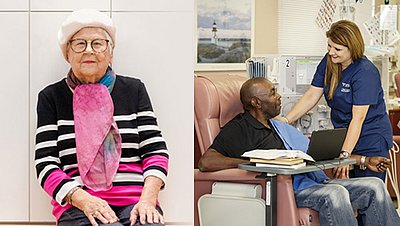Our patient stories and company features.
Miracle Man
Raymond Scott from South Carolina was 29 years old and fresh out of the military when he received the unexpected diagnosis of kidney failure. “I saw myself as ten foot tall and bulletproof. I couldn’t be touched. And then I ‘crashed’ into dialysis unplanned and without warning. When the physicians told me that my kidneys were failing, it left me feeling empty and hollow,” Raymond Scott recalls the fateful hospital visit in 1998 where he had gone to see the physician about a lingering cough and high blood pressure. “They were explaining things to me, but I wasn’t hearing it. All I could think was: How much time do I have left?”
That was 25 years ago. Today, he looks back on two-and-a-half decades as a dialysis patient in which he has thrived, regained his positive outlook on life and become a husband and father of two teenagers. He and his wife, Analyn, have turned their journey as kidney patient and devoted caregiver into a source of strength to educate others far beyond their immediate circle of family and friends. “We could never have guessed what would lie ahead of us,” says Analyn Scott. “But looking back we wouldn’t change a thing. This is part of our purpose and destiny. I call Raymond a ‘miracle man’ for what he’s been through. It has given us this strong sense of responsibility and urgency to reach as many people as possible so they can be better informed and master the challenges that come with this disease.”
A shared future
“We’ve come to realize that the general population is often clueless about kidney disease. That’s simply not acceptable. Even we are still learning new things about the disease every day. We want to help other patients to have all the information they need about their disease – for their own sakes and that of their partners or their children, who want to have them around for as long as possible.”
It took the couple several years to adjust to their new situation. Raymond Scott started treatment with peritoneal dialysis at a Fresenius Medical Care dialysis clinic in February 1998. “At the beginning, we didn’t know that the average life expectancy for someone with kidney failure was five to ten years. But we said, let’s stick together and not let what’s coming change our shared future,” he recalls this sudden, momentous life change.
Five years of freedom
In 2001, Raymond Scott received a kidney as a living donation from his brother and started getting used to this new sense of independence. But after just five years, his body rejected the donated organ and he had to resume in-center visits, this time with hemodialysis three times a week. “Many dialysis patients think that once they have received a transplant, it’s over. But that’s not true for all of us,” he says. “Looking back, I consider it a gift from my brother. He gave me five years of freedom to do the things I wanted.”
This second round of dialysis starting in 2006 allowed Raymond and Analyn to continue to live their lives together and grow their family. Transitioning to home hemodialysis with an NxStage machine in 2012 was another milestone that gave Raymond Scott greater flexibility and independence. It also made the couple feel more strongly about educating other patients on the available treatment modalities and how these can help them to lead a better life.
An invitation to the annual fundraising gala of the National Kidney Foundation in 2015 was a pivotal moment for the Scotts. It allowed them to expand their outreach from friends and relatives to the general public. “That night, we heard things about kidney disease that floored us. For instance, that 26 million Americans, or one in nine adults, are at various stages of kidney disease, but most of them don’t know it. Or that African- Americans are four times more likely to develop kidney failure,” says Analyn, who went on to channel her commitment into a foundation called 1in9 Charities, Inc.
Her husband had taken up the challenge to take part in 2016’s Dancing with the Stars Arizona. After months of training, he performed Pharrell Williams’s hit song “Happy”, helping to raise both funds and awareness for his future campaigning on behalf of kidney patients. Since then, the Scotts have been busy organizing various community events, such as free health screenings throughout Arizona and beyond.
Asking the right questions
What the couple found during their nationwide outreach campaign is a lack of awareness, often coupled with limited access to information about a healthy lifestyle and treatment options once kidney disease or failure has been diagnosed. “My wife is a fierce advocate on my behalf. That’s why I love to call her my bulldog,” says Raymond Scott. “But not everyone has someone like that who asks doctors the right questions – and keeps asking them, again and again. Patients like me need the opportunity to have those conversations. We deserve to be informed and empowered to make decisions that can have a huge impact on our life and longevity. I’m living proof of that.”





